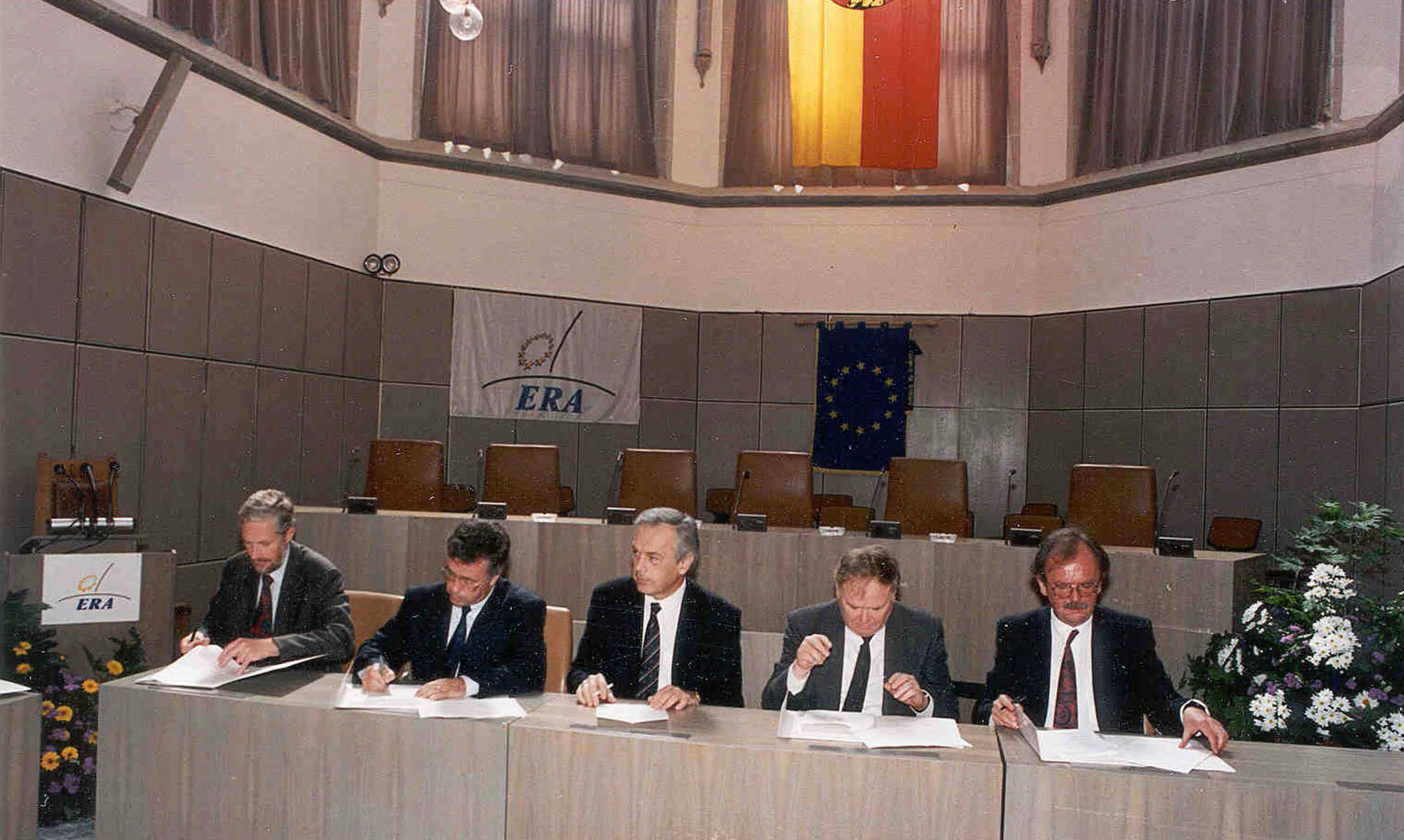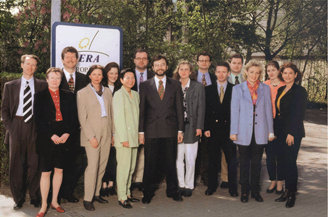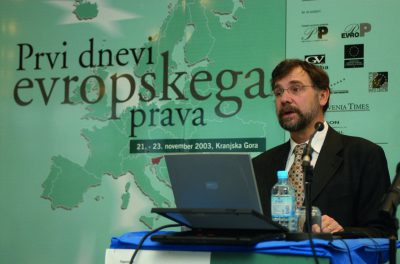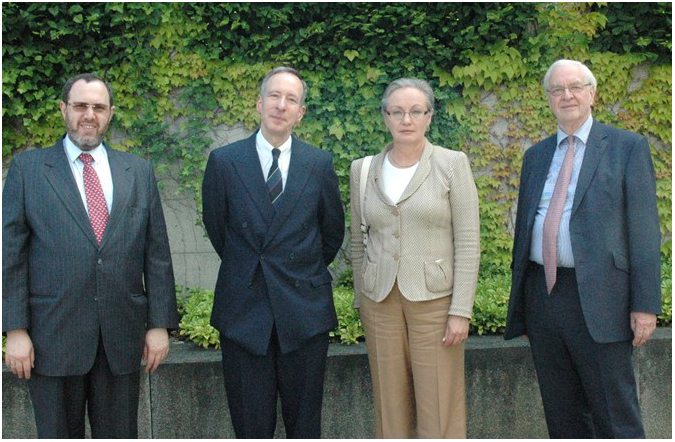- 1. Early years
- 2. Official launch
- 3. Conference Centre
- 4. Enlargement
- 5. Judicial training
- 6. Reforms
Foundation and early years
The establishment of the Academy of European Law in Trier in the legal form of a non-profit public foundation on 22 June 1992 did not happen by accident in the same year as the completion of the European Single Market. On the basis of the Single European Act of 1986, the European Commission under Jacques Delors had set in motion a comprehensive legislative programme for the completion of the Internal Market by the end of 1992, which for the first time made legal practitioners in all twelve Member States aware of the growing relevance of Community law. Moreover, the Treaty on European Union, signed in Maastricht on 7 February 1992, with its further expansion of legislative powers, made it clear that the ever-widening integration by means of legislation would be further deepened and continued after 1992.
In this context it soon became obvious that lawyers and notaries, judges and prosecutors, in-house counsel, civil servants and other legal practitioners would need regular training and a forum for discussion to keep abreast of developments in the field of European Community law, which was new to them. As early as 1990, the European Parliament called on the Commission to promote a training centre for legal practitioners to ensure the application and enforcement of European law. Against this background, the then Minister of Justice of Rhineland-Palatinate, Peter Caesar, in cooperation with MEPs Horst Langes and Willi Rothley, both also from Rhineland-Palatinate, and the “Gesellschaft für Rechtspolitik” (Society for Legal Policy), under the leadership of Peter-Christian Müller-Graff, a European law professor from Trier, drew up proposals for an Academy of European Law to be founded in Trier.
With a large majority, the European Parliament supported these proposals in 1991 in a report drafted by Dutch MEP James Janssen van Raay. With the participation of renowned experts in European law, including the President of the European Court of Justice Ole Due, an Association for the Promotion of the Academy of European Law was set up to make the idea a reality. The Luxembourg government, led by Prime Minister Jacques Santer, joined the initiative and the European Commission agreed to Parliament’s decision to provide regular financial support for the Academy. Trier was chosen as the seat of the Academy because of its proximity to Luxembourg as the seat of the courts of the European Union.
Official launch
Hence it was that on 8-9 November 1991, the Academy of European Law was ceremoniously launched in Trier in the presence of more than 200 participants from all Member States and the then accession countries Austria, Finland and Sweden – one week ahead of the Francovich ruling of the European Court of Justice, three months before the signing of the Maastricht Treaty on European Union and seven months before the formal establishment of the Academy. The agreement on the founding act was signed in Trier on 22 June 1992; the founding patrons were the Grand Duchy of Luxembourg, the State of Rhineland-Palatinate and the City of Trier, as well as the Association for the Promotion of the Academy.

In 1992, the year of its formal establishment, a small team of committed staff began to introduce the Academy to the target groups with a preliminary programme on topics of European law, some of which have lost none of their topicality to this day (asylum and immigration law; proposal for a directive on liability for services; combating subsidy fraud; State aid). From 1993 onwards, the programme was systematically structured and expanded according to event types, initially on a narrow basis. At the same time, the development of a programme tailored to the specific needs of the former socialist countries in Central and Eastern Europe began, with which these – to be regarded as future accession candidates – could be assisted in preparing for their eventual membership. ERA's first events in cooperation with the Hungarian Ministry of Justice, Jagiellonian University and the Polish Supreme Court took place as early as February and March 1993 in Budapest, Cracow and Popowo near Warsaw.
While it was not possible to expand the circle of patrons – with the exception of the German Länder and the Federal Government – before the end of the 1990s, the Board of Trustees, which was crucial for the development of the programme and the provision of contacts in the Member States and with professional groups, was conceived from the very beginning as a pan-European body. Even in the early years of the Academy, it brought together outstanding expertise in European law and policy from the judiciary, the legal profession, politics and academia from all Member States. Under its first presidents Willi Rothley MEP and John Toulmin CMG QC (from 1997), the Board of Trustees provided valuable impulses to help the Academy professionalise its activities and set down roots across Europe, as well as sustainably promoting its internal autonomy. There is no doubt that, even in the 1990s, ERA's programmes were genuinely European in terms of subject matter, design and speakers.
The Conference Centre
Although the city of Trier had committed itself to contributing a suitable conference site when the foundation was established, it took until 1998 before ERA was able to put its own congress centre into service. Until then, courses and conferences that were not organised in other European cities were mainly held in hotels in Trier. Finally, in the summer of 1998, the Academy moved into the conference building, designed and built according to the requirements set by the Academy itself, and financed by the state of Rhineland-Palatinate. The conference centre, built together with the new headquarters of the State branch of the Central Bank and an integrated conference hotel in a uniform design, was officially opened on 11 September 1998 in the presence of the Presidents of the European Commission Jacques Santer, the European Parliament José María Gil-Robles Gil-Delgado, the European Court of Justice Gil Carlos Rodríguez Iglesias and the EFTA Court Thór Vilhjálmsson.

With the steadily increasing demand for the Academy's events over the following ten years, the expansion of its overall programme, the considerable increase in the number of participants and the necessary expansion of its staff, the capacity of the conference centre soon reached its limits. From 2005 onwards, the planned closure of the branch of the Deutsche Bundesbank, which was built at the same time as the conference centre, offered a unique opportunity to expand office and conference capacity on the same premises. The Academy's management succeeded in raising the necessary funds from its patrons – primarily the Federal Republic of Germany and the state of Rhineland-Palatinate where the Academy has its seat – to purchase the former Bundesbank office building in 2009 and to integrate it structurally into the existing conference centre by 2011 without exceeding the tightly calculated budget of €8m. The expanded congress centre was ceremonially opened on 25 March 2011.
As part of its conference centre, the Academy has built up a specialised library collecting publications on all areas of European law from both European and national perspectives. Since 1999, the library has been recognised as a European Documentation Centre and offers an up-to-date archive of all official EU publications in English, French and German.
Enlargement of the Foundation
To take advantage of the political momentum in the narrow period between the development of the ERA concept in 1990-91 and the completion of the Single Market in 1992, it was important for the Academy to be founded quickly, which at that time was only possible through the joint efforts of one EU Member State and one German State. However, restricting the circle of patron States to only one or – following Germany's accession in 1994 - two out of twelve or - as of 1995 - fifteen EU Member States led to increasing doubts about the genuine European character of the Academy, even though the initiative for its foundation had come from the European Parliament. Hence, when Wolfgang Heusel was appointed Director in January 2000, the expansion of the Foundation became his most important priority.

According to its statutes, accession to the Foundation was and is open to all Member States and accession countries of the European Union. Unlike the joint establishment of a European institute by the Member States, winning them over to join an institute that already existed and was recognisably functioning without their formal patronage was not a foregone conclusion. Starting with Ireland in October 2000, in a process lasting two decades, it was possible to win over all 26 other EU Member States as patrons of the Foundation by October 2018. It is worth mentioning that some of the acceding countries – Poland, Hungary and Croatia – became ERA patrons before joining the EU. On the other hand, the United Kingdom, which joined in 2004, and Scotland, which joined in 2005, did not lose their status as patrons when they left the European Union.
The patrons in chronological order of their accession:
1992 Luxembourg, Rhineland-Palatinate, the City of Trier, the Association for the Promotion of ERA (founding patrons)
1994 all sixteen German states jointly; the Federal Republic of Germany
2000 Ireland
2001 Poland, Greece, Spain
2002 Portugal, Italy, the Netherlands, United Kingdom
2003 Hungary, Sweden, Finland, Austria
2005 Slovakia, France, Scotland
2006 Cyprus
2007 Malta, Slovenia, Romania
2008 Czech Republic, Bulgaria
2009 Croatia
2012 Lithuania
2014 Denmark
2016 Latvia
2017 Belgium
2018 Estonia
European judicial training
From the outset, ERA’s Statute defined ”individuals and authorities involved in the application and implementation of European law” as the target groups of its programme work. The main professional groups addressed therefore include judges, prosecutors and judicial staff, lawyers and notaries, all of whom are now also the focus of the European Union’s judicial training policy.

Very early on, representatives of various European judges’ associations and individual national judicial schools contacted the Academy in order to develop training courses tailored to the specific needs of the national judiciaries and to familiarise judges and prosecutors more closely with European law, which was then largely unknown to them. In 1999, this cooperation led to the project of establishing a network of judicial training institutions in the EU, for which a “Charter” was drafted in 2000 under the auspices of ERA, presented at a conference of the French Presidency in Bordeaux in October 2000 and signed by judicial training institutions of all fifteen Member States and ERA by the end of that year. The German Bundesministerium der Justiz, the Spanish Consejo General del Poder Judicial, the French Ecole Nationale de la Magistrature, the Italian Consiglio Superiore della Magistratura, the Portuguese Centro de Estudos Judiciários, the Swedish Domstolsverket and the English & Welsh Judicial Studies Board were instrumental in drafting the Charter. ERA acted as depositary of the accession declarations and was appointed Secretariat of the new European Judicial Training Network EJTN by its first General Assembly in Stockholm in March 2001, a role it served until March 2005.
ERA subsequently pursued the transformation of the informally founded network into an association with its own legal personality, a decision eventually adopted by the General Assembly in Copenhagen in December 2002. Even after the Network took over its Secretariat in 2005, ERA was committed to EJTN’s further consolidation and the acceptance of the new EU Member States in 2004 and 2007. ERA has been regularly elected to the Network’s Steering Committee since 2005 and has coordinated its Programmes Working Group since 2011.
Foundation reforms 2000 and 2019
The bodies of the Academy of European Law Foundation were originally the Governing Board, which, as the representation of the patrons, appoints all other bodies; the Executive Board managing the Academy's business, which consisted of a director and up to two deputies, as well as the Board of Trustees, which was conceived as an advisory body. Of the European Union institutions, the Parliament, the Court of Justice and the Commission were invited to delegate their own representatives with full voting rights. The Governing Board appointed Peter Caesar, then Minister of Justice of the state of Rhineland-Palatinate, as the first Director, whose ministry provided considerable personnel and logistical support during the Academy's start-up phase. Meanwhile, one of the two deputies, Ernst Merz, who had been released from judicial service in Rhineland-Palatinate, took over the on-site management of the Academy.

It soon became apparent that the construction of a board led out of a state ministry and the unclear demarcation between political leadership and day-to-day management did little to demonstrate the Academy's European character and led to unavoidable friction as business operations grew. After Peter Caesar's departure due to illness in the summer of 1999 and the departure of Ernst Merz at the end of 1999, the new director Wolfgang Heusel, initially only appointed as acting director, proposed a fundamental reform to the Governing Board in March 2000, which removed the actual management from direct political intervention and gave the political level the appropriate supervisory responsibility at the level of the Governing Board. The Governing Board adopted the reform with the proviso that the former Executive Board should henceforth be labelled "Management Board" and a new political body called "Executive Board" should be introduced, which, however, would only have advisory functions.
Another special feature of the original constitution of the foundation was the privileges granted to the State of Rhineland-Palatinate in return for its obligation, entered into when the foundation was established, to cover the costs of the foundation not covered elsewhere. In return, the state received the right to nominate a second representative with full voting rights to the Governing Board, who was entitled to veto all decisions of the Board having an impact on finances, i.e. in particular the annual budget. In fact, between 1993 and 2020, the State of Rhineland-Palatinate funded ERA with a total amount of over €48 million for building and operating costs, so that the Governing Board decided in November 2019 to release the State from its liability obligation and in return to abolish its statutory prerogatives. Since 2020, the legal position of the State no longer differs in principle from that of other patrons, even though it remains connected to the Academy in a special way as the State in which it has its seat.
Presidents of the Governing Board since its establishment
1992-2000 Horst Langes
2000-2021 Jacques Santer
As of 2021 Jean-Claude Juncker
Chairpersons of the Board of Trustees since its establishment
1992-1997 Willi Rothley
1997-2010 John Toulmin CMG QC
2010-2021 Pauliine Koskelo
Chairpersons of the new Executive Board since its introduction
2000-2002 Ana Palacio
2002-2006 Herbert Mertin
2006-2014 Klaus-Heiner Lehne
2015-2019 Pavel Svoboda
As of 2021 Sabine Verheyen
Directors since ERA’s establishment
1992-1999 Peter Caesar (Dep. Director Ernst Merz)
2000-2020 Wolfgang Heusel
As of 2021 Jean-Philippe Rageade
